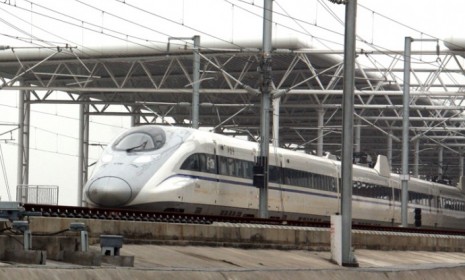High-speed rail: Financial suicide for California?
Lawmakers in the Golden State approve $4.6 billion in financing for a high-speed line connecting Los Angeles and San Francisco, but critics say it's a train to nowhere

A free daily email with the biggest news stories of the day – and the best features from TheWeek.com
You are now subscribed
Your newsletter sign-up was successful
Lawmakers in California have approved $4.6 billion in bond sales to finance construction of a high-speed rail that is supposed to link San Francisco and Los Angeles by 2032. (Upping the ante, Amtrak has proposed a $151 billion plan to bring the bullet train to the East Coast.) In 2008, Californians supported the project, voting to approve $10 billion in bonds, which would be combined with $3.3 billion promised by the federal government. But California residents have since turned against high-speed rail — the projected cost has shot up to $68 billion, from an original $33 billion, and the Golden State is currently struggling to fill a massive hole in its budget that has been exacerbated by the Great Recession. Critics say the bullet train is a boondoggle that will only add to California's debt, while much of the $68 billion will merely line the pockets of contractors and unions. Is California committing fiscal suicide by going ahead with the project?
Yes. The state has enough problems: "In the face of a slow-motion fiscal train wreck," it's ludicrous for California to take on more debt to finance a "high-speed rail line that practically nobody wants," says Ben Boychuk at the New York Post. The first phase of construction is "a 130-mile stretch of rail between Madera and Bakersfield, where only a tiny fraction of Californians live and work," making the project a literal train to nowhere. Gov. Jerry Brown (D) has proposed $8.5 billion in new taxes to close a $13 billion deficit, which thankfully will come up for a referendum in November, giving voters a chance to "slam the brakes on this fiscal crazy train" by rejecting his budget.
The Week
Escape your echo chamber. Get the facts behind the news, plus analysis from multiple perspectives.

Sign up for The Week's Free Newsletters
From our morning news briefing to a weekly Good News Newsletter, get the best of The Week delivered directly to your inbox.
From our morning news briefing to a weekly Good News Newsletter, get the best of The Week delivered directly to your inbox.
No. A high-speed rail would be good for business: Critics deride the project as a train to nowhere, but nothing could be further from the truth, says Eric Jaffe at The Atlantic. "Evidence from around the world makes it quite clear that once the bullet train is completed," people will ride it. "Lots of them." Studies show that a high-speed rail line not only encourages people to travel, but to shift from driving to train-riding. "The former would be great for California's economy; the latter, a relief to its congested highways."
"Of course people will ride California HSR"
And the government must invest in infrastructure: The government is the only entity that can undertake "big, important, useful" projects like high-speed rail, says Patt Morrison at The Los Angeles Times. "American businesses wouldn't have built the interstate highway system — its rewards to the commerce and to the nation, in ways perceptible and imperceptible, have been immense." California's bullet train could perform a similarly invaluable service, and opponents have unfortunately been swayed by "timidity of ambition or narrowness of vision."
"Is California's high-speed train on track or off the rails?"
A free daily email with the biggest news stories of the day – and the best features from TheWeek.com